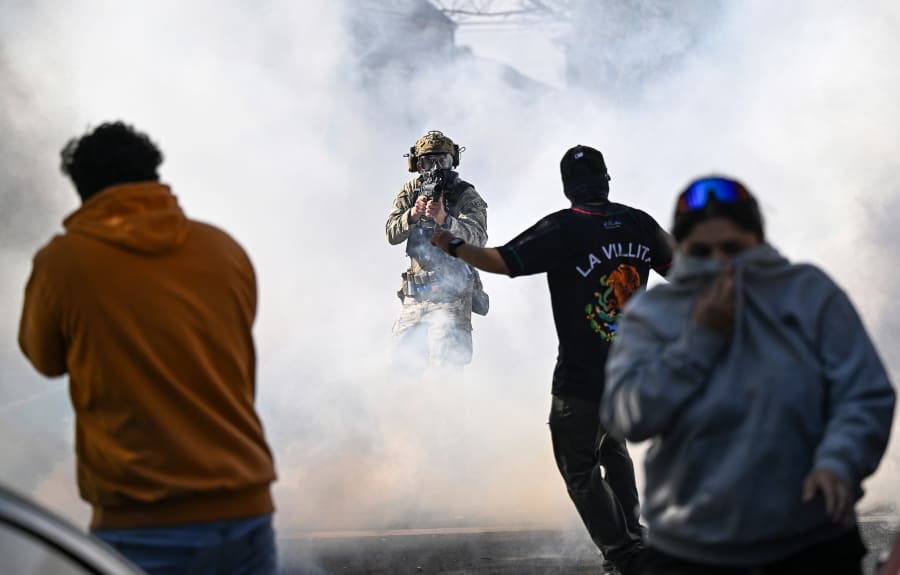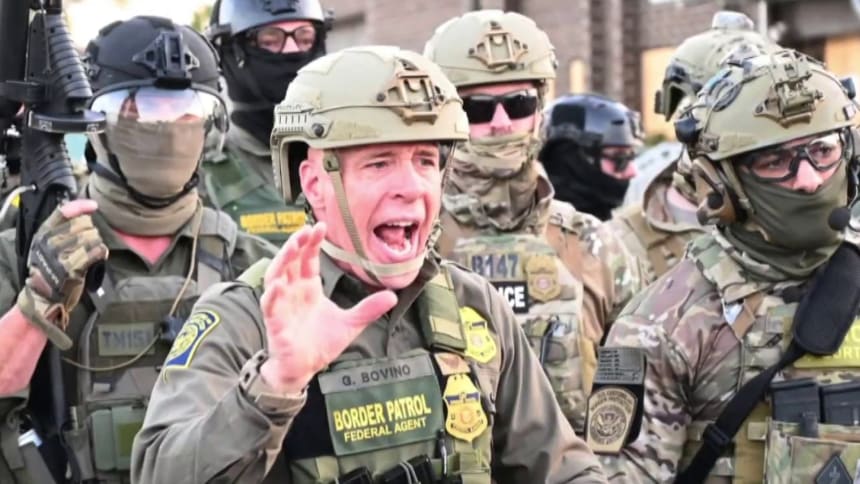Americans are deeply divided on many issues, but there is a basic principle on which we should agree: Government officials should not give false or misleading testimony in judicial proceedings.
That simple fact, the importance of truth, is underscored in federal District Judge Sara Ellis’ Nov. 20 decision finding that Immigration and Customs Enforcement and Border Patrol used excessive force in Chicago during operations since mid-September – and lied or misled about their activities. Her scathing ruling was reinforced Tuesday with the release of related depositions by Border Patrol Commander Gregory Bovino.
Judge Ellis details a pattern of brutality and false testimony by border and immigration agents as well as administration officials.
In her 223-page opinion, Ellis documents numerous instances of federal agents using force against peaceful protesters and others and instances when Trump administration officials did not testify accurately about what they saw and did. Ellis details a pattern of brutality and false testimony by border and immigration agents as well as administration officials. Among the criticisms, the decision chides Bovino for being evasive, uncredible and “outright lying.”
The issue is not simply that truth is the legal standard in court proceedings – where witnesses and jurors alike swear an oath to tell the truth. The Supreme Court has also made it clear that government officials have heightened obligations of candor when they testify in courts of law.
Consider what the court said in a 1935 case concerning the misbehavior of a federal prosecutor: “The United States Attorney is the representative not of an ordinary party to a controversy, but of a sovereignty whose obligation to govern impartially is as compelling as its obligation to govern at all, and whose interest, therefore, in a criminal prosecution is not that it shall win a case, but that justice shall be done.”
“As such,” the high court continued, “he is in a peculiar and very definite sense the servant of the law…(and), while he may strike hard blows, he is not at liberty to strike foul ones.”
Public employees have an obligation to speak truthfully when they make “statements pursuant to their official duties,” the court emphasized.
Seven decades later, the Supreme Court reinforced this view. In a 2006 case involving a sheriff who misrepresented facts in a search warrant affidavit, the court held that public employees “occupy trusted positions in society. When they speak out, they can express views that contravene governmental policies or impair the proper performance of governmental functions.”
Public employees have an obligation to speak truthfully when they make “statements pursuant to their official duties,” the court emphasized.
In her recent decision, Ellis said Trump administration officials had struck “foul” blows on the streets of Chicago and in her courtroom. Their misleading statements impaired “the proper performance of governmental functions,” she wrote.

“This case,” Ellis wrote, “ultimately turns on whether the Chicagoland area, and Chicago specifically, is the City of Big Shoulders or Chipocalypse Now.” The president used the latter term in a September social media post suggesting the city was a war zone.
“Defendants would have people believe,” Ellis said, adding, “that the Chicagoland area is in a vise hold of violence, ransacked by rioters, and attacked by agitators – which justifies the unprecedented swath of indiscriminate uses of force unleashed on journalists, peaceful protestors, and religious practitioners. That narrative simply is untrue. … Defendants’ own evidence in this case belies that assertion.”
The judge assessed video of various occasions when ICE used force against protesters and compared the footage with testimony from government officials about those incidents. Time after time, the video contradicted their claims, she wrote.
After reviewing all the evidence submitted and listening to testimony from preliminary injunction and other court proceedings, “the Court finds Defendants’ evidence simply not credible,” Ellis wrote.
It is “difficult, if not impossible, to believe almost anything that Defendants represent,” she said.
It is “difficult, if not impossible, to believe almost anything that Defendants represent,” the judge said.
Ellis paid particular attention to testimony from Bovino, who played a key role in the ICE activities known as Operation Midway Blitz. He “appeared evasive over the three days of his deposition, either providing ‘cute’ responses to Plaintiffs’ counsel’s questions or outright lying,” Ellis wrote.
But, as MS NOW’s Jordan Rubin points out, “It wasn’t just Bovino. Ellis deemed the government’s conduct untrustworthy overall. She wrote that after reviewing the evidence, including body camera footage, officials’ ‘widespread misrepresentations call into question everything’ they’ve claimed about what’s happening in the streets of the Chicagoland area during law enforcement activities.”
That’s a damning indictment of the Trump administration’s top immigration officials and the lawyers who represent them.
Much has been written about Trump supporters’ willingness to tolerate lies from the president, though the standard to which Trump supporters hold other administration officials is less clear. But it is not just Trump supporters who should worry if ICE officials cannot be trusted to be truthful in court or when talking about the threat posed by the people they are rounding up and deporting.
If immigration officials are not trustworthy, perhaps neither are administration leaders who speak about the Epstein files, or grocery prices or alleged cartel activity in Venezuela.
But courtroom evasions and falsehoods are a particular dereliction of duty. Supporters of the Trump administration should recognize that America cannot be made great again by those who do not respect their legal obligation to be truthful and candid with courts and judges.
Austin Sarat
Austin Sarat is the William Nelson Cromwell Professor of Jurisprudence and Political Science at Amherst College. The views expressed here do not represent Amherst College.









